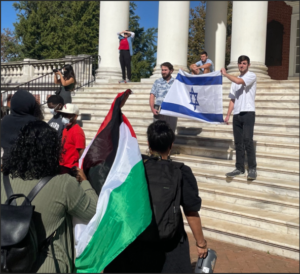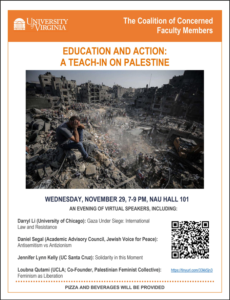 by James A. Bacon
by James A. Bacon
Matan Goldstein is a rarity at the University of Virginia — a Jewish student unafraid to openly defend Israel in its war with Hamas and oppose Students for Justice in Palestine (SJP), a pro-Palestinian group that praised Hamas’ October 7 terror attacks on Israeli citizens. The Israeli student has appeared on local talk radio and published an op-ed in the local newspaper. He wears a kippah, openly identifying himself as a Jew, and he was one of the two students who waved an Israeli flag on the steps of the Rotunda during an SJP rally.
Goldstein, who was drawn to UVa by its classics program, was surprised upon coming to Charlottesville by the prevalence of antisemitism and the impotent handwringing of the UVa administration in dealing with it. University officials have declined to criticize the eliminationist rhetoric of pro-Palestinian students and faculty. Instead, the University has created a religious diversity task force to investigate discrimination against Jews… and Muslims… and other religions. Two of the eleven task-force members had signed a faculty letter faulting Ryan for his failure to sufficiently acknowledge the suffering of the Palestinians.
Goldstein’s account is echoed by other members of UVa’s Jewish community contacted by The Jefferson Council, although he was the only one willing to speak on the record. A law school student spoke off the record, while parents, alumni, a professor and a rabbi conveyed the sentiments of many other Jewish students whom I was unable to contact for first-hand accounts. Jewish students are so reticent to speak publicly that the signatories to a letter in The Cavalier Daily identified themselves only as “a group of Jewish students.”
During his first-year orientation in September, Goldstein participated in a group discussion in which students told others about themselves. He mentioned that he was Israeli. A classmate, a student from Egypt, spoke up. He said he was angry at the Jewish state and the Israeli Defense Force. He thought Abdul Gamal Nasser, an Egyptian dictator who sought to destroy Israel in the Six Day War, was a hero. “He said we could never be friends.”
Anti-Israeli animus intensified after October 7. The UVa chapter of the Students for Justice in Palestine (SJP) endorsed the Hamas actions (without referring to the slaughter of 1,200 women, children, grandmothers, babies and other civilians) on the grounds that Israelis oppressed Palestinians and that liberation “by any means necessary” was called for. The SJP organized two rallies near the Rotunda, waved Palestinian flags, and chanted, “Palestine will be free from the river to the sea,” which, in light of the recent massacres, Goldstein viewed as a call for the eradication of the Israeli state and dispossession or murder of its seven million Jewish citizens.
President Jim Ryan issued a statement denouncing the Hamas terror attacks, but he pointedly has not criticized SJP for contributing to the hostile environment for Jews at UVa. Unhappy with Ryan’s neutrality, 80 UVa professors signed a letter declaring themselves “unsettled” by his failure to recognize the sufferings of the Palestinians and calling for the October 7 horrors to be viewed “in context.”

That letter was followed by a “teach in” on the Grounds marked by inflammatory anti-Israel rhetoric.
“They called my country a colonial entity that had enslaved Palestine for 75 years,” Goldstein says. They described Jews “as colonizers and committers of genocide.” The outrage about civilian casualties in Gaza, he observes, vividly contrasts with the total disinterest in the hundreds of thousands of civilians killed in civil wars in Syria, Libya, Yemen and Sudan, he observes. “It’s just Jew hatred at this point.”
Other than getting shoved by SJP marchers when he was displaying the Israeli flag, he has not experienced any physical violence, Goldstein says. None of my other sources attested to violence or threats of violence at UVa either, but incidents on other campuses combined with the prevailing rhetoric on Grounds leave many Jewish students uneasy.
Schlomo Mayer, rabbi of the Chabad House, interacts with Jewish students during meals and Bible study. “Some are discouraged,” he says. “Some say they are afraid to leave their house.”
Pro-Palestinians say they are anti-Zionists opposing the Jewish state, not Jews generally, but Goldstein says anti-Zionism often spills over into antisemitism. People frequently flash their middle fingers at him. When he was lunching with a professor one day, someone passed by and shouted, “Free Palestine, you filthy Jew!”
Nothing much can be done about such invective. Goldstein didn’t know the student, he says, so he couldn’t report him.
However, a law school student cites a case in which the identity of the student is known. Jewish law school students put up posters bearing the images of some hostages held by Hamas to raise money for their families. A pro-Palestinian law student tore the posters down. Student Affairs did track down the perpetrator and did inform him or her that tearing down posters violated the student code of conduct. The student gave assurances that he or she would not repeat the offense. However, as far as the law student knows, the individual was never punished.
The mood at UVa is ugly, the law student says. “You have a significant anti-Israel narrative supported by students and faculties, and embedded in that narrative is a willingness to kill innocent Jews.”
Consider the SJP rallies at UVa. The pro-Palestinian group promoted the first anti-Israel rally with a poster showing a bulldozer knocking down the border fence between Gaza and Israel, allowing Gaza fighters to pour through and attack nearby Israeli settlements. SJP issued a statement declaring its unequivocal support for Palestinian liberation “by whatever means necessary.” During its rallies, SJP supporters masked their faces, reminiscent of the face-covering keffiyehs worn by terrorist killers. At one rally, a demonstrator wore a rat costume emblazoned with a yellow Star of David.
Robert Parham, an Iranian-born Jew who fled Iran and settled in Israel before coming to the United States as a professor at the McIntire school, says that Jewish students and parents started contacting him after the massacres in Israel. One student told him other students came into his dormitory room and threatened him. Another said she doesn’t feel safe going to class. A third wanted to attend a pro-Israeli counterdemonstration but was afraid for her safety and didn’t want to go by herself, he says.
“UVA has become an unsafe place for Jewish students both in and out of the classroom,” says a letter addressed to Ryan and signed by 300 Jewish alumni, parents and friends. There have been blatant breaches of UVa’s student code of conduct, the letter declared. “Our students are hurting. They are isolated, anxious, and emotionally affected…. It has been quite difficult to study and engage when antisemitism is pervasive … in classrooms, at the Rotunda, and in friendship circles. Some professors are excusing students from class for walkouts, to go to rallies, and offering extra credit for attending them. Other professors are having their entire class attend these hate-based rallies, while others are utilizing their own platforms to encourage participation.”
The professors releasing their students from class did so in direct violation of an order from the provost not to. None have been reprimanded, at least not publicly.
What has been Ryan’s response? He has met with a number of Jews in the UVa community and professed concern for all who suffer from the Israeli-Hamas conflict. Answering the parents’ letter, he said that threatening physical harm is impermissible, and antisemitic statements or statements in support of terrorism are “deplorable.” But he declined to take sides in the controversy between Palestinians and Jews at UVa.
Issuing statements about current events was a “very slippery slope,” he explained. “To start down the road of condemning specific statements that contravene our values, as tempting as it is at times, is to start down a road that is endless. Before you know it you are the arbiter of debates about the morality of all sorts of statements.”
Free speech isn’t easy, Ryan concluded.
Neither is being a Jew at UVa these days.
James A. Bacon is executive director of The Jefferson Council. This article is republished with permission from the Jefferson Council blog.

Leave a Reply
You must be logged in to post a comment.